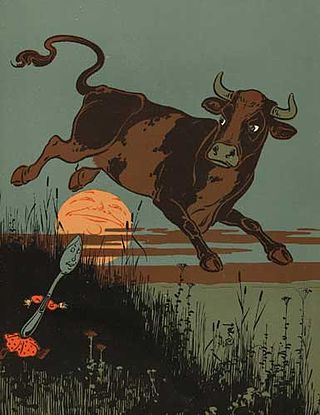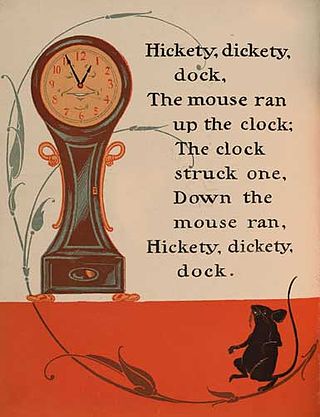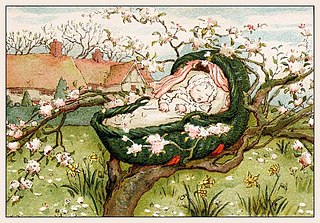
A nursery rhyme is a traditional poem or song for children in Britain and many other countries, but usage of the term dates only from the late 18th/early 19th century. The term Mother Goose rhymes is interchangeable with nursery rhymes.

Mother Goose is a character that originated in children's fiction, as the imaginary author of a collection of French fairy tales and later of English nursery rhymes. She also appeared in a song, the first stanza of which often functions now as a nursery rhyme. The character also appears in a pantomime tracing its roots to 1806.

"Ladybird, Ladybird" is the first line of an English-language nursery rhyme that also has German analogues. It is included in the Roud Folk Song Index as number of 16215.

"Hey Diddle Diddle" is an English nursery rhyme. It has a Roud Folk Song Index number of 19478.

"Pat-a-cake, pat-a-cake, baker's man", "Pat-a-Cake", "Patty-cake" or "Pattycake" is an English nursery rhyme. It has a Roud Folk Song Index number of 6486.

"Peter Peter Pumpkin Eater" is an English language nursery rhyme. It has a Roud Folk Song Index number of 13497.

"Hickory Dickory Dock" or "Hickety Dickety Dock" is a popular English-language nursery rhyme. It has a Roud Folk Song Index number of 6489.

A clapping game is a type of usually cooperative game which is generally played by two players and involves clapping as a rhythmic accompaniment to a singing game or reciting of a rhyme, often nursery rhymes. Clapping games are found throughout the world and similar games may be known throughout large areas with regional variation.

"Jack Sprat" is an English language nursery rhyme. It has a Roud Folk Song Index number of 19479.

Pease pudding, also known as pease porridge, is a savoury pudding dish made of boiled legumes, typically split yellow peas, with water, salt and spices, and often cooked with a bacon or ham joint. A common dish in the north-east of England, it is consumed to a lesser extent in the rest of Britain. In Newfoundland, it retains its traditional name as part of the customary Jiggs dinner. In non-English speaking countries, similar dishes exist under different names.
A children's song may be a nursery rhyme set to music, a song that children invent and share among themselves or a modern creation intended for entertainment, use in the home or education. Although children's songs have been recorded and studied in some cultures more than others, they appear to be universal in human society.
"See Saw Margery Daw" is an English language nursery rhyme, folk song and playground singing game. The rhyme first appeared in its modern form in Mother Goose's Melody, published in London in around 1765. It has a Roud Folk Song Index number of 13028.

"Rock-a-bye baby on the tree top" is a nursery rhyme and lullaby. It has a Roud Folk Song Index number of 2768.
"One, Two, Three, Four, Five" is a nursery rhyme and counting-out rhyme. It has a Roud Folk Song Index number of 13530.

"Little Tommy Tucker" is an English language nursery rhyme. It has a Roud Folk Song Index number of 19618.
"Girls and Boys Come Out to Play" or "Boys and Girls Come Out to Play" is a nursery rhyme that has existed since at least 1708. It has a Roud Folk Song Index number of 5452.
"Diddle, Diddle, Dumpling, My Son John" is an English language nursery rhyme. It has a Roud Folk Song Index number of 19709.

‘Little Robin Redbreast’ is an English language nursery rhyme, chiefly notable as evidence of the way traditional rhymes are changed and edited. It has a Roud Folk Song Index number of 20612.
Porridge is a dish made by boiling ground, crushed, or chopped starchy plants—typically grain—in water, milk or both.

Pea soup or split pea soup is soup made typically from dried peas, such as the split pea. It is, with variations, a part of the cuisine of many cultures. It is most often greyish-green or yellow in color depending on the regional variety of peas used; all are cultivars of Pisum sativum.
















